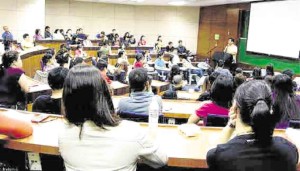Getting professional real estate service

Resa aims to develop a corps of technically competent, responsible and respected professional real estate service practitioners.
When someone offers to sell you a condominium unit or a real estate property, there are a few questions you have to ask first before you consider the offer.
You need to know if he/she is a licensed real estate broker or an accredited real estate salesperson or agent. If an accredited salesperson, who is her/his real estate broker? In short, is he/she licensed or accredited to be in the practice of real estate services?
Passed by Congress on May 12, 2009, Republic Act No. 9646 or the Real Estate Service Act (Resa) regulates the practice of real estate service in the Philippines. The law states that only five types of professionals can be considered to be in the practice of real estate services.
These were identified as the real estate brokers, appraisers, assessors, consultants, and the salespersons (Sec 3.g).
All, except for the real estate salespersons, have to be duly registered and licensed by the Professional Regulation Commission (e.g. they have to take and pass a PRC qualifying examination).
Real estate salespersons are not required to pass a PRC qualifying examination but they are to be accredited by the PRC after complying with a set of requirements.
They are also to perform service for and in behalf of a real estate broker, who is registered and licensed by the PRC. Thus, a salesperson or agent cannot sell by himself or herself. He/She has to work in behalf of a broker.
The Resa, which took effect on July 30, 2009, aims “to develop and nurture through proper and effective regulation and supervision a corps of technically competent, responsible and respected professional real estate service practitioners.”
The practitioners are “to have standards of practice and service which shall be globally competitive and will promote the growth of the real estate industry.”
There are however exemptions to the acts constituting the practice of Real Estate Service. As stated in Section 28, the exemptions are as follows:
Any person, natural or juridical, who shall directly perform by himself/herself with reference to his/her or its own property;
Any receiver, trustee or assignee in bankruptcy or insolvency proceedings;
Any person acting by order of any court of justice;
Any person who is a duly constituted attorney-in-fact for purposes of sale, mortgage, lease or exchange, or other similar contracts of real estate, without requiring any form of compensation or remuneration; and
Public officers in the performance of their official duties and functions, except government assessors and appraisers.
Section 39, on the other hand, defines the penalties for violations. If a licensed Resa professional is found to be violating the provisions, the penalty is P100,000 and/or imprisonment of not less than two years.
The penalty is doubled if the violation is committed by an unlicensed real estate service practitioner—like a salesperson selling real estate without a supervising broker.
This would mean a fine of P200,000 and/or imprisonment of not less than four years.














